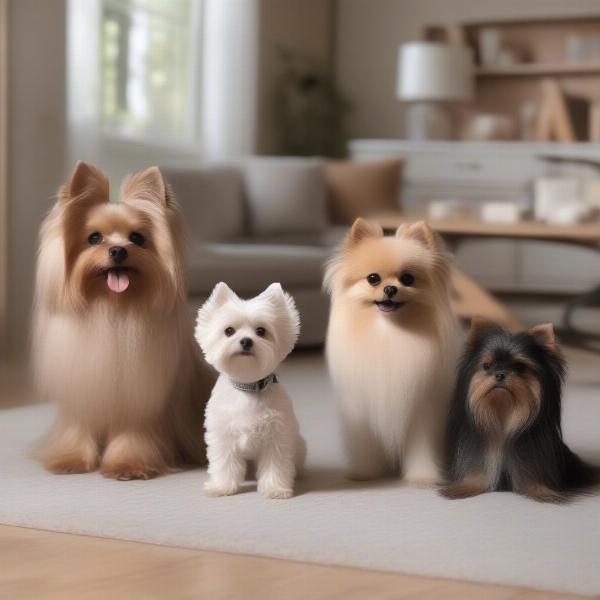Decorative dogs, often small breeds chosen for their appealing looks and temperament, add a unique charm to any home. But beyond their aesthetic appeal, they’re living beings with specific needs and deserve the same care and consideration as any other dog. Choosing a decorative dog involves understanding their unique characteristics, ensuring their well-being, and integrating them seamlessly into your lifestyle.
Understanding the Appeal of Decorative Dogs
Many people are drawn to decorative dogs for their compact size, making them suitable for apartment living and easier to handle. Breeds like the Maltese, Yorkshire Terrier, and Pomeranian are popular choices, admired for their fluffy coats and endearing personalities. However, it’s crucial to remember that “decorative” doesn’t mean low-maintenance. These dogs require just as much attention, training, and socialization as larger breeds.
 Maltese, Yorkshire Terrier, and Pomeranian
Maltese, Yorkshire Terrier, and Pomeranian
What truly sets decorative dogs apart is their ability to enhance a home’s atmosphere. Their playful antics and affectionate nature bring joy and companionship to their owners. Their presence can even create a sense of warmth and liveliness, making a house feel more like a home.
Choosing the Right Decorative Dog for You
Selecting a decorative dog breed should be based on more than just looks. Consider your lifestyle, living space, and experience with dogs. Research different breeds, paying attention to their temperament, grooming needs, and exercise requirements.
Are you an active individual who enjoys long walks? Or do you prefer cozy evenings at home? Matching your lifestyle to a dog’s energy level is essential for a harmonious relationship. For example, a high-energy breed like a Miniature Pinscher might not be the best choice for someone living in a small apartment with limited outdoor space. A calmer breed, like a Cavalier King Charles Spaniel, might be a better fit.
Caring for Your Decorative Dog: Health, Nutrition, and Training
Like all dogs, decorative breeds need regular veterinary checkups, a balanced diet, and proper training. Their smaller size can make them more susceptible to certain health issues, so regular vet visits are crucial. ribbons for dogs can be a fun way to dress up your decorative dog.
Nutrition is another key aspect of their well-being. Choose high-quality dog food formulated for small breeds to ensure they receive the necessary nutrients. Training and socialization are equally important, regardless of size. Early socialization helps them develop into well-adjusted adults who can confidently navigate different environments. Consider using fancy dog collars for small dogs.
Creating a Safe and Enriching Environment
Decorative dogs thrive in environments that cater to their needs. This includes a comfortable sleeping area, access to fresh water, and plenty of toys to keep them entertained. While their smaller size might make them seem delicate, they still need regular exercise and mental stimulation. Providing a stimulating environment helps prevent boredom and destructive behaviors. A dog cage for small dogs can be a useful tool for training and providing a safe space.
Conclusion
Decorative dogs can bring immense joy and companionship to our lives. By understanding their specific needs and providing them with proper care, we can ensure they live long, healthy, and fulfilling lives, enriching our homes with their unique canine charm. Remember that collars for white dogs can help keep your dog visible and safe.
FAQ
- What are some popular decorative dog breeds? Popular choices include Maltese, Yorkshire Terriers, Pomeranians, and Cavalier King Charles Spaniels.
- Do decorative dogs need as much exercise as larger breeds? While they may not need as much vigorous exercise, they still require regular physical activity and mental stimulation.
- What are some common health concerns for decorative dogs? Some breeds are prone to certain health issues, so regular veterinary checkups are crucial.
- What kind of diet is best for decorative dogs? High-quality dog food formulated for small breeds is recommended to ensure they receive the necessary nutrients.
- How important is training for decorative dogs? Training and socialization are essential for all dogs, regardless of size, to ensure they develop into well-adjusted adults.
- What should I consider when creating an environment for a decorative dog? Provide a comfortable sleeping area, access to fresh water, plenty of toys, and opportunities for exercise and mental stimulation.
- Where can I find more information about specific decorative dog breeds? You can find a wealth of information about dog breeds on reputable websites like the American Kennel Club (AKC) and the United Kennel Club (UKC).
Related Articles
No related articles found.
ILM Dog is a leading online resource for dog owners and enthusiasts worldwide. We provide expert advice on dog breeds, health, training, nutrition, grooming, and much more. Our mission is to empower dog owners with the knowledge and resources they need to provide the best possible care for their canine companions. Browse our extensive library of articles and discover the perfect products for your furry friend. Contact us at [email protected] or +44 20-3965-8624. ILM Dog offers expert advice and resources to help you navigate the wonderful world of dog ownership. We also offer a curated selection of dogs coffee table book for dog lovers.